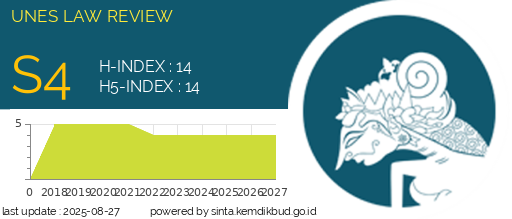Penerapan dalam Praktik Pembuatan Perjanjian Perkawinan Untuk Perkawinan Campuran
DOI:
https://doi.org/10.31933/unesrev.v6i1.1096Keywords:
Marriage Agreement, Mixed Marriag, Authentic Deed, Underhand DeedAbstract
Humans are basically created in pairs to carry out daily life activities, therefore humans are referred to as social beings who need the help of others in carrying out an action. For the sake of the realization of forming a harmonious and happy family, it must go through a marriage bond. Indonesia adheres to written law, in which a marriage can take place must meet the requirements for a valid marriage contained in the Marriage Law, namely Law Number 1 of 1974. If marriage has been carried out, it will have legal consequences between husband and wife, namely one of them regarding the existence of a mixture of assets obtained during the marriage. The problems that arise at the time of marriage are not least about the mixing of these assets, in this case to avoid problems that arise later on, husband and wife couples can make a marriage agreement, especially for those who are married to foreign nationals. The form of the marriage agreement in ordinary society is still unclear whether it has to be with a notary deed or just underhanded, where this becomes an uncertainty about the form of the marriage agreement and its legal consequences. The purpose of this research is to provide an insight for the community so that they are no longer wrong in making a marriage agreement and to find out how the position of the marriage agreement itself is. This research method uses normative juridical by analyzing legislation, then a conclusion can be drawn: marriage agreements should still be carried out using a notarial deed where to prove it when a dispute occurs it can be perfectly proven and the authenticity of the identity of the parties who made it is clear.
Downloads
References
Soedharyo Soimin, S.H.2006. Kitab Undang-Undang Hukum Perdata (KUH Per). Sinar Grafika.
Dr. Agus Purnomo, Lutfiana Di Mayasari, M.H., M.MSI. 2021. Dinamika Hukum Perjanjian Perkawinan Di Indonesia. Inteligensia Media.
Dr. Benny Djaja, S.H., S.E., M.M., Sp.N., M.RE., M.Hum., M.Kn. 2020. Perjanjian Kawin Sebelum, Saat, dan Sepanjang Perkawinan. KENCANA.
Firman Floranta Adonara. 2020. Kewenangan Notaris Mengesahkan Perjanjian Kawin Sebagai Amanat Konstitusi. Jurnal Ilmu Kenotariatan. Volume 1 Issue 2 (2020).
Made Topan Antakusuma, Dewa Gde Rudy. 2017. Perlindugan Hukum Terhadap Harta Suami - Istri Dengan Adanya Perjanjian Kawin. Kertha Semaya, Vol.05, No.01, Januari 2017.
Sylvia Widjaja. Aneka Permasalahan Mengenai Perjanjian Kawin Pengesahan Atau Pencatatan.
Kitab Undang-Undang Hukum Perdata (KUHPerdata)
Undang-Undang Nomor 1 Tahun 1974 Tentang Perkawinan (Undag-Undang Perkawinan)
Undang-Undang Nomor 30 Tahun 2004 tentang Jabatan Notaris yang telah diperbaharui dengan Undang-Undang Nomor 2 Tahun 2014 tentang Jabatan Notaris
Putusan Mahkamah Konstitusi No 69/PUU-XIII/2015



















